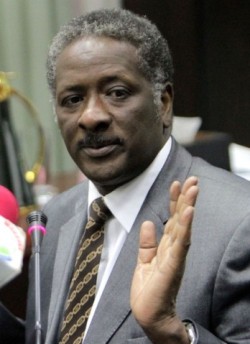Sudan finance minister says no decision made on wage increases, labor union disagrees
December 22, 2012 (KHARTOUM) – The Sudanese Finance Minister Ali Mahmoud Abdel-Rasool denied reports that the government has made a decision to increase wages and stressed that the issue is still being reviewed.

The Sudanese official said that the commission would submit its findings to the cabinet no later than March 2013.
But the head of Sudan’s labor union Ibrahim Ghandour speaking via telephone at a show on privately-owned Blue Nile TV said Abdel-Rasool’s remarks contradicts an unannounced agreement between the two sides to implement the increase on two stage starting next January.
This deal was given the blessings of the president, 1st Vice President and 2nd Vice President, he disclosed.
A clearly irate Ghandour questioned how Sudanese workers can live off 260 Sudanese pounds a month ($59 based on official rate) and accused the finance ministry of reneging on their deal.
“We are talking about 165 pounds [increase] only” Ghandour said and warned that not acting on the union’s demands could put them “in confrontation” with the state.
Twenty minutes later the finance minister called into the TV show to deny Ghandour’s assertions saying that he only agreed “on the principle” of raising wages without giving any specifics or offering any timeline.
He said that the presidential committee on wages has to present its findings for approval first before the finance ministry can implement any possible increases.
“After the parliament approved the [2013] budget….[how] are we going to do something [spend more money] outside of the budget?” Abdel-Rasool posed the question.
The official said that should the cabinet endorse a committee recommendation on increasing wages then the budget could be amended accordingly at that time but not before then.
Asked how the government could fund such an increase, Abdel-Rasool declined to offer details saying that new resources will be found.
The finance minister hung up the phone when pressed on whether this would come through raising taxes or further lifting subsidies as he stressed in the past.
After months of staunch opposition Abdel-Rasool hinted this week that the government will move ahead with bumping wages but cautioned that he does not know by how much.
Khartoum is hesitant to proceed with lifting the minimum wage and argues that the country simply does not have the money to support such an increase and as such this move will only fuel an already high inflation.
The loss of the oil-rich South Sudan has forced the Sudanese government to adopt tough austerity measures last summer involving partially lifting subsidies and slashing federal as well as state governments.
The government also devalued the currency after failing to contain the sharply declining value of the pound in the black market which is now 60% higher than the official rate. This has contributed to soaring prices of basic commodities most of which are imported from abroad.
The inflation rate in Sudan now stands at 46.5% according to a government report released this month. This among others has provided the labor union with ammunition to press the government on raising wages.
(ST)
